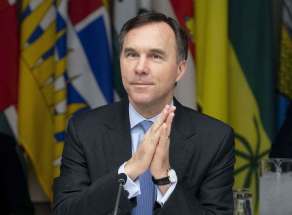Morneau must do better on jobless rate
Read this article for free:
or
Already have an account? Log in here »
To continue reading, please subscribe:
Monthly Digital Subscription
$0 for the first 4 weeks*
- Enjoy unlimited reading on winnipegfreepress.com
- Read the E-Edition, our digital replica newspaper
- Access News Break, our award-winning app
- Play interactive puzzles
*No charge for 4 weeks then price increases to the regular rate of $19.00 plus GST every four weeks. Offer available to new and qualified returning subscribers only. Cancel any time.
Monthly Digital Subscription
$4.75/week*
- Enjoy unlimited reading on winnipegfreepress.com
- Read the E-Edition, our digital replica newspaper
- Access News Break, our award-winning app
- Play interactive puzzles
*Billed as $19 plus GST every four weeks. Cancel any time.
To continue reading, please subscribe:
Add Free Press access to your Brandon Sun subscription for only an additional
$1 for the first 4 weeks*
*Your next subscription payment will increase by $1.00 and you will be charged $16.99 plus GST for four weeks. After four weeks, your payment will increase to $23.99 plus GST every four weeks.
Read unlimited articles for free today:
or
Already have an account? Log in here »
Hey there, time traveller!
This article was published 13/01/2020 (2157 days ago), so information in it may no longer be current.
Canada’s unemployment rate stood at 5.6 per cent in December, Statistics Canada reported on Friday. That’s exactly where the rate stood a year earlier and close to where it has been for the past two years.
Canada’s job performance in recent years shows that low interest rates and government deficits produced good results for a while — so good that the 5.4 per cent unemployment rate achieved in May last year was the lowest Canada has seen in the 43-year history of the labour force survey as it is now conducted.

The magic of cheap money and government deficits worked for a couple of years, bringing the unemployment rate down to 5.8 per cent in February 2018, from its 7.3 per cent peak two years earlier. For the last 22 months, however, the rate has oscillated in a narrow range around 5.8 per cent. The magic is no longer working. Employment growth has continued — just fast enough to keep pace with population growth, not fast enough to reduce the ranks of the unemployed.
Finance Minister Bill Morneau in December projected a federal deficit of $26.6 billion in the current fiscal year and delivered the small tax cut the Liberals had promised in the election campaign. A sudden spike in the unemployment rate reported in December suggested there could be a need for emergency measures to promote employment growth. The latest unemployment figures, however, show that there is no job collapse going on, just the same stagnation Canada has been living with for two years.
U.S. experience has been strikingly different. The U.S. unemployment rate has dropped pretty steadily from the 10 per cent peak that followed the 2007-09 recession to the 3.8 per cent December level reported last week. (The U.S. calculates unemployment in a different way from Canada.) Like Canada, the U.S. has also relied on cheap money and government deficits to fuel prosperity. For them, the magic still appears to be working.
Mr. Morneau theorizes that Canadians should be happy with their slow economic growth because the leading European economies are worse off than we are. But when our dominant trading partner, the United States, is enjoying economic expansion at a rate of two per cent per year, it seems odd that Mr. Morneau is willing to settle for Canadian economic growth of 1.7 per cent in 2019 and 1.6 per cent in 2020.
The finance minister boasted in his December economic update that Canada is expected to be the second-fastest-growing economy in the Group of Seven industrial countries. That, however, is a thin boast when the fastest-growing, the U.S., is also the largest and the one nearest to Canada in every respect.
Japan is in a period of sustained economic decline and the European economies are nervously watching the fracturing of their economic union. It is strictly true that Canada is not in the same basket with those ill-starred economies, but Canadians are unlikely to join Mr. Morneau in setting their sights so low.
The finance minister should be figuring out why Canada has not been able to grow in step with the United States. By the time he produces his spring budget, he should have measures to offer the country that will encourage Canadian business to resume expansion in the normal way and bring employment growth back to the pace the country needs.












